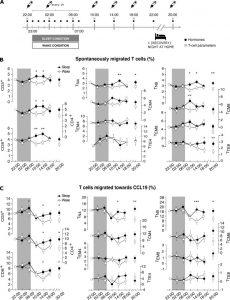Catching those Zzz’s isn’t just good for your mood and energy; a new study reveals it also supercharges your immune system! Researchers have discovered how sleep enhances the ability of T cells, crucial to the immune system, to travel to lymph nodes (Figure 1).

Figure 1: Sleep increases the spontaneous and CCL19-directed migration of different T-cell subsets. (A) Healthy participants spent two 24-hour sessions in the sleep laboratory with repeated blood sampling for the determination of T-cell parameters (gray squares) and hormones (black circles). In the Sleep condition, participants had regular sleep at night while in the Wake condition, they spent the 24-hour period awake while staying in bed during the night-time period. They spent the subsequent night at home before returning the next day to the laboratory for a further blood sampling at 20:00 h. (B) Estimated marginal means ± SEM of the percentage of migrated CD3+, CD4+, and CD8+ T cells and their TN, TCM, TEM, and TTE CD4+ and CD8+ subsets in the absence of any exogenous chemokine (i.e., spontaneous migration) or (C) in the presence of the chemokine CCL19 during a regular sleep-wake cycle (filled circles) and during 24 h of continuous wakefulness (open circles). Gray area indicates time in bed. n = 14 (7 males, 7 females). *p < 0.05, **p < 0.01, ***p < 0.001 for pairwise comparisons between conditions. See Table 1 for overall results of the linear mixed models analyses.
Previous studies showed people who slept after vaccination had a much stronger immune response compared to those who stayed awake. This new research explains the cellular mechanism behind this phenomenon.
The study demonstrates that sleep significantly improves T cells’ ability to migrate towards lymph nodes. This migration is guided by a special protein called CCL19, which acts like a beacon for T cells. Sleep seems to enhance T cells’ ability to detect and follow this crucial signal.
Researchers discovered that soluble factors, substances present in higher concentrations during sleep, play a key role. They identified growth hormone and prolactin as the key players influencing T cell migration. Both hormones showed increased levels in the blood of participants who slept well.
These findings suggest that growth hormone and prolactin could potentially be used as new vaccine adjuvants – substances that enhance the immune response to vaccinations. This could be particularly beneficial for older adults, who naturally have lower levels of these hormones during sleep.
Getting enough sleep isn’t just about feeling refreshed; it’s a vital part of maintaining a strong immune system. So next time you’re tempted to burn the midnight oil, remember – a good night’s sleep might be your best defense against illness.
Journal article: Martínez-Albert, E., et al., 2024. Sleep promotes T-cell migration towards CCL19 via growth hormone and prolactin signaling in humans. Brain, Behavior, and Immunity.
Summary by Stefan Botha










